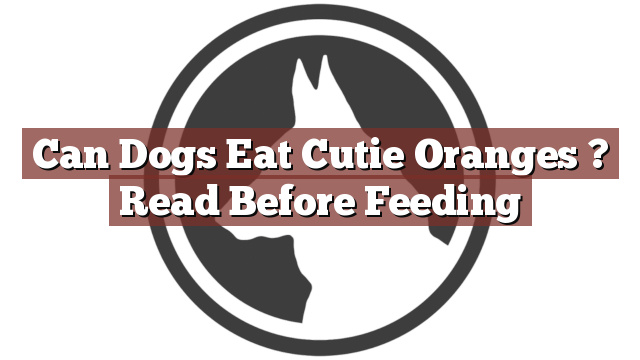Understanding Your Dog’s Dietary Needs
As responsible pet owners, it is essential to understand our dogs’ dietary needs in order to provide them with a balanced and healthy diet. While dogs are primarily carnivorous animals, they can also benefit from some fruits and vegetables in moderation. However, it is crucial to be aware of which foods are safe for dogs to consume and which ones can be harmful to their health.
Can Dogs Eat Cutie Oranges? Read Before Feeding
Can dogs eat Cutie oranges? This is a common question among dog owners who may be tempted to share their favorite citrus snack with their furry friends. The answer is yes, but with some precautions. Cutie oranges, also known as mandarins or tangerines, are a rich source of vitamins and minerals that can be beneficial for dogs when given in moderation. However, it is important to note that not all dogs will react the same way to oranges, so it is essential to introduce this fruit gradually into their diet and monitor their reaction.
While Cutie oranges are generally safe for dogs to eat, it is crucial to remove the peel and any seeds before feeding them to your furry friend. The peel can be difficult for dogs to digest and may cause digestive issues such as upset stomach or diarrhea. Additionally, the seeds can pose a choking hazard or potentially lead to intestinal blockages. Therefore, it is best to feed your dog only the juicy segments of the orange and avoid offering them the peel or seeds.
Pros and Cons of Feeding Cutie Oranges to Dogs
Feeding Cutie oranges to your dog can have its advantages and disadvantages. On the positive side, oranges are a good source of vitamin C, which can boost your dog’s immune system and promote overall health. The fruit also contains dietary fiber, which can aid digestion and regulate bowel movements. Moreover, oranges are low in calories and fat, making them a healthy treat option for dogs who need to watch their weight.
However, it is important to consider the drawbacks as well. Oranges are acidic fruits, and excessive consumption can lead to stomach upset or even gastritis in some dogs. The high sugar content in oranges can also contribute to weight gain or potential issues for dogs with diabetes or other conditions that require a low-sugar diet. Therefore, it is crucial to limit the amount of orange given to your dog and consult with your veterinarian if you have any concerns or specific dietary restrictions for your pet.
Conclusion: Make Informed Decisions for Your Dog’s Health
In conclusion, dogs can eat Cutie oranges, but it should be done in moderation and with caution. Removing the peel and seeds is crucial to avoid any potential health issues. While oranges can provide some health benefits to dogs, it is important to be aware of the risks associated with excessive consumption or specific health conditions. As always, it is recommended to consult with your veterinarian before introducing any new food into your dog’s diet, as they can provide personalized advice based on your dog’s individual needs and health status. By making informed decisions, you can ensure that your furry friend receives a well-balanced and nutritious diet to support their overall well-being.
Thank you for taking the time to read through our exploration of [page_title]. As every dog lover knows, our furry friends have unique dietary needs and responses, often varying from one canine to another. This is why it's paramount to approach any changes in their diet with caution and knowledge.
Before introducing any new treats or making alterations to your dog's diet based on our insights, it's crucial to consult with a veterinarian about [page_title]. Their expertise ensures that the choices you make are well-suited to your particular pet's health and well-being.
Even seemingly harmless foods can sometimes lead to allergic reactions or digestive issues, which is why monitoring your dog after introducing any new food item is essential.
The content provided here on [page_title] is crafted with care, thorough research, and a genuine love for dogs. Nevertheless, it serves as a general guideline and should not be considered a substitute for professional veterinary advice.
Always prioritize the expert insights of your veterinarian, and remember that the health and happiness of your furry companion come first.
May your journey with your pet continue to be filled with joy, love, and safe culinary adventures. Happy reading, and even happier snacking for your canine friend!

